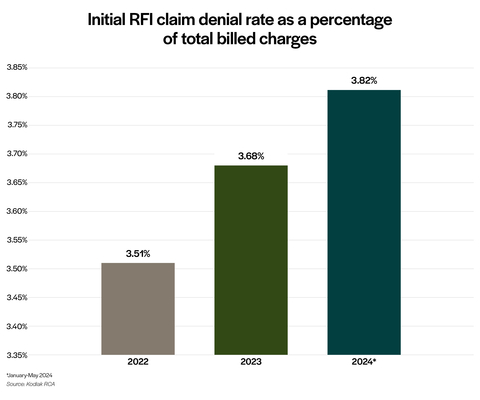New Kodiak Solutions revenue cycle benchmarking report details payor behavior on information requests by payor type, care setting, state
Health insurers are increasingly using requests for more information to initially deny claims from hospitals, health systems and medical practices, delaying billions of dollars in payments, according to a new Kodiak Solutions quarterly revenue cycle benchmarking report.
This press release features multimedia. View the full release here: https://www.businesswire.com/news/home/20240808692914/en/

Health insurers are increasingly delaying payment to medical providers by requesting more information on submitted claims. (Photo: Business Wire)
As a percentage of total billed charges, the denial rate from initial requests for information (RFI) has increased by nearly 9% from 2022 to 2024, from 3.51% of total billed charges to 3.82%, an analysis of data from Kodiak Solutions’ Revenue Cycle Analytics shows. The rate for 2024 covers the period January 1 through May 31.
These initial denials delay payment on claims until provider organizations can assemble the information requested by the payor. For the first five months of 2024, $6 billion in claims were delayed across Kodiak’s RCA benchmarking community of more than 1,900 hospitals and 250,000 practice-based physicians. Prorated over an entire year, that would be $14.4 billion, up from $11 billion in 2022.
And the initial RFI denials aren’t a sign that insurers are receiving more bad claims: In 2023, about 88% of the total billed charges of RFI denials were ultimately paid by insurers, a 35% increase from 2022, when insurers paid about 65% of the total billed charges of RFI denials, according to Kodiak Solutions data analysis.
“Our analysis suggests that health insurers are using RFI denials to simply slow down claims that they ultimately will pay, just to reap the benefits of paying more slowly,” said Colleen Hall, senior vice president and Revenue Cycle leader at Kodiak Solutions. “Health systems and medical practices have to pay the expenses related to these claims, such as wages and benefits to clinical staff, well before they are paid for the care they delivered, in addition to the added costs to fulfill those information requests.”
The report also outlines steps provider organizations can take to mitigate the effects of RFI denials. These steps include developing a formal and ongoing strategy to deal with initial RFI claim denials, quantifying the costs of each payor’s RFI behavior to inform contract negotiations, and creating data communities with peers to better understand payor behavior.
The August 2024 Kodiak RCA Benchmarking Analysis provides additional data on initial RFI denials by payor type and care setting, as well as the rates of initial RFI denial by state.
To view the full report, please visit “Death by a thousand requests.”
About Kodiak Solutions
Kodiak Solutions is a leading technology and tech-enabled services company that simplifies complex business problems for healthcare provider organizations. For nearly two decades as a part of Crowe LLP, Kodiak created and developed our proprietary net revenue reporting solution, Revenue Cycle Analytics. Kodiak also provides a broad suite of software and services in support of CFOs looking for solutions in financial reporting, revenue cycle, risk and compliance, and unclaimed property. Kodiak’s 400 employees engage with more than 1,900 hospitals and 250,000 practice-based physicians, across all 50 states, and serve as the unclaimed property outsourcing provider of choice for more than 2,000 companies. To learn more, visit our website.
View source version on businesswire.com: https://www.businesswire.com/news/home/20240808692914/en/
“Our analysis suggests that health insurers are using RFI denials to simply slow down claims that they ultimately will pay, just to reap the benefits of paying more slowly,” Colleen Hall, senior vice president and Revenue Cycle leader at Kodiak Solutions.
Contacts
For Media:
Vince Galloro
(312) 625-2137
vince.galloro@sunrisehlth.com

